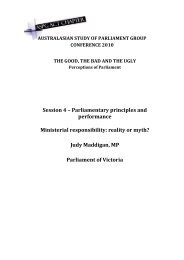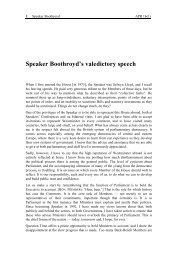Australasian Parliamentary Review Autumn 2011, Vol. 26, No. 1
Australasian Parliamentary Review Autumn 2011, Vol. 26, No. 1
Australasian Parliamentary Review Autumn 2011, Vol. 26, No. 1
You also want an ePaper? Increase the reach of your titles
YUMPU automatically turns print PDFs into web optimized ePapers that Google loves.
<strong>Australasian</strong> <strong>Parliamentary</strong> <strong>Review</strong><br />
<strong>Autumn</strong> <strong>2011</strong>, <strong>Vol</strong>. <strong>26</strong>, <strong>No</strong>. 1<br />
FROM YOUR EDITOR<br />
Jennifer Aldred 1<br />
ADDRESS 3<br />
A gallows of hung parliaments: A Western Australian perspective<br />
C.P. Shanahan SC 4<br />
ARTICLES 22<br />
#<br />
1843: The year it all began<br />
David Clune 23<br />
A hard reign: NSW public administration under Labor — 2007 to <strong>2011</strong><br />
<strong>No</strong>rman Abjorensen 41<br />
# The power of the New Zealand legislature to fine for breach of privilege<br />
David Wilson 53<br />
#<br />
From talking shop to party government: procedural change in<br />
the New Zealand parliament, 1854–1894<br />
John E Martin 64<br />
AUSTRALASIAN STUDY OF PARLIAMENT GROUP CONFERENCE 2010:<br />
THE GOOD, THE BAD AND THE UGLY — PERCEPTIONS OF PARLIAMENT 82<br />
Keynote address: Fifteen (contradictory) perceptions of parliament:<br />
five good, five bad and five ugly<br />
John Warhurst 83<br />
Parliament, public opinion and privilege 88<br />
#<br />
Restoring faith in the British Parliament<br />
Phil Larkin 89<br />
Paying the police: ‘Greengate’ and parliamentary privilege<br />
Brian Costar 99<br />
#<br />
Maintaining public trust in parliaments without freedom of information —<br />
balancing the right to know with parliamentary privilege<br />
Vicki Buchbach 106<br />
Parliament, the executive and the media 121<br />
Fault lines in the federal fourth estate<br />
Helen Ester 122
#<br />
Media use and its effect on trust in politicians, parties and democracy<br />
Juliet Pietsch and Aaron Martin 131<br />
The tablecloth and the long bell: media perceptions of the NSW<br />
Legislative Council 1999–2009<br />
Steven Reynolds 142<br />
<strong>Parliamentary</strong> principles and performances 157<br />
Ministerial responsibility: reality or myth<br />
Judy Maddigan 158<br />
# ‘Mr Speaker, I withdraw ...’: standards of (mis)behaviour in the<br />
Queensland, Western Australian and Commonwealth Parliaments<br />
compared via online Hansard<br />
Christopher Salisbury 166<br />
Promoting parliament: civic education and social media 178<br />
Perceptions of parliament: the civic education factor<br />
Harry C.J. Phillips 179<br />
Social media, community engagement and perceptions of parliament:<br />
a case study from the NSW Legislative Council<br />
Beverly Duffy and Madeleine Foley 198<br />
Summary of conference proceedings<br />
Rosemary Laing 207<br />
REPORT FOR ASPG 213<br />
Hung parliaments — summary of proceedings of seminar held by<br />
the Western Australia Chapter of the ASPG, <strong>No</strong>vember 2010<br />
Harry C.J. Phillips 214<br />
PARLIAMENTARY CHRONICLES 221<br />
‘From the Tables’ A round-up of administrative and procedural<br />
developments in the <strong>Australasian</strong> Parliaments —<br />
October 2010 to March <strong>2011</strong><br />
Robyn Smith 222<br />
#<br />
These papers have been double blind reviewed to academic standards.<br />
© <strong>Australasian</strong> Study of Parliament Group. Requests for permission to reproduce material<br />
from <strong>Australasian</strong> <strong>Parliamentary</strong> <strong>Review</strong> should be directed to the Editor.<br />
ISSN 1447-9125
From your editor<br />
Welcome to this edition of the <strong>Australasian</strong> <strong>Parliamentary</strong> <strong>Review</strong>.<br />
APR is fortunate to have as its Address for this issue a presentation by Christopher<br />
Shanahan SC, former Vice President of the WA Bar Association. Chris has a<br />
special interest in constitutional law and his Address considers the adequacy of the<br />
WA Constitution when an election, such as the 2008 WA election, returns a hung<br />
parliament. This election involved significant changes to the geographic distribution<br />
of parliamentary seats and regions in WA following a redistribution in 2007. It was<br />
also the first to be held using one-vote-one-value for the lower house, bringing WA<br />
into line with the rest of Australia.<br />
Chris’s paper was the keynote address at a seminar conducted by the WA Chapter<br />
of the ASPG titled ‘Hung parliaments: the constitutional and political ramifications<br />
(UK, Tasmanian, Australian and WA experiences)’. Harry Phillips has summarised<br />
the proceedings of this important seminar and his piece gives the Shanahan Address<br />
greater context.<br />
Articles in this issue cover NSW and New Zealand parliamentary and political<br />
history — distant and current — and I pay tribute to the four authors involved for<br />
the quality of their work.<br />
David Clune documents the events in NSW in the year 1843 and <strong>No</strong>rman<br />
Abjorensen does likewise for the state under the Australian Labor Party 2007–<strong>2011</strong>.<br />
The contrasts and the similarities between the two are striking. Both deal with<br />
Parliament’s traditional role of holding the executive to account, one in colonial<br />
times, the other today, one empowering, one frustrated.<br />
David Wilson and John Martin provide two perspectives on the New Zealand<br />
parliament. David, through case study, examines the limited power to punish for<br />
contempt arguing that, based on the Australian experience, New Zealand may<br />
benefit by placing the power in the general law rather than in Standing Orders. John<br />
Martin’s piece is a study of parliamentary business in 19 th century New Zealand in<br />
relation to the British and Australian state parliaments. He argues that a shifting<br />
balance between parliament and the executive has led to a dominance in New<br />
Zealand of the executive. This is the first of two pieces by John — the second to<br />
appear in the Spring <strong>2011</strong> of APR and dealing with the 20 th Century events.<br />
<strong>Australasian</strong> <strong>Parliamentary</strong> <strong>Review</strong>, <strong>Autumn</strong> <strong>2011</strong>, <strong>Vol</strong>. <strong>26</strong>(1), 1–2.
2 Jennifer Aldred APR <strong>26</strong>(1)<br />
The good, the bad and the ugly is the title of the 2010 <strong>Australasian</strong> Study of<br />
Parliament Group conference. Organised by the ACT Chapter of ASPG,<br />
proceedings examined public perceptions of parliament. Most of the papers<br />
presented at the conference appear in this issue. Through a range of subject areas,<br />
they explore the tricky question of why public trust in our governmental and<br />
parliamentary institutions has diminished. As John Warhurst says, they have a<br />
public relations problem which needs to be addressed. I was particularly impressed<br />
with the creativity of the younger researchers and writers at the conference,<br />
providing as they did contemporary analysis of and solutions to ever broadening<br />
community cynicism and disengagement. Dr Rosemary Laing, Clerk of the Senate,<br />
has written a thorough and engaging summary of the proceedings. Rosemary’s<br />
piece is highly recommended not just as a meticulous précis of all that was covered<br />
at the conference but for her appraisal of why we should cultivate the good, deal<br />
with the bad and learn to live with the ugly.<br />
A new edition to the journal is ‘From the Tables’. While designed to inform staff of<br />
parliaments in Australia and New Zealand of developments that may have some<br />
practical application in their jurisdiction, it will be a valuable resource for anyone<br />
with an interest in parliamentary procedural and administrative matters. My thanks<br />
go to Robyn Smith for the idea and the authorship. It will be a regular feature of the<br />
APR and feedback from readers would be appreciated.<br />
In conclusion, the journal would not be produced without the interest and<br />
commitment of authors, of members of the Editorial Committee who give their time<br />
to providing advice and expertise and the technical skills of our desktop publisher,<br />
Stephanie Hancock. Thanks to all.<br />
Jennifer Aldred
















